A low-profile start-up quietly backed by Amazon founder Jeff Bezos has suddenly burst into the headlines, Dubbed Slate Auto, the Michigan-based automaker rolled out an all-electric pickup Thursday night that, it said, will go on sale in late 2026 for “under $20,000.” But rather than delivering another high-tech wonder, the Slate pickup draws its inspiration from a low-tech past. Will Americans embrace an EV with crank-up windows and no infotainment screen? Headlight.News has more.
A new automotive start-up called Slate Auto has certainly gotten one thing right: “The definition of what’s affordable is broken,” said Chris Barman, the former Fiat Chrysler executive who’s now running Slate Auto.
The typical vehicle sold in the U.S. last month drove off the last for a transaction price of nearly $50,000, according to industry data, and a monthly payment of $742. The average EV cost at least $5,000 more. No wonder, then, auto analysts keep talking about “peak auto,” as more and more American motorists get priced out of the new vehicle market.
Slate claims to have an answer to that problem. Late Thursday, during a well-attended event in Long Beach, California, it revealed an all-electric pickup that officials promised to start building late next year. There are already a number of EV pickups on the market, like the Ford F-150 Lightning, the Rivian R1T and the controversial Tesla Cybertruck. Why should this new offering stand out in a segment suffering from decidedly weak sales? Because, said Barman, Slate’s little truck will start at “under $20,000.” But there are a bunch of asterisks that, when you check the fine print.
Where’s the tech?
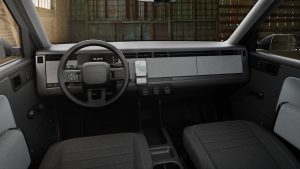
The basic Slate pickup will be a simple affair. Want infotainment? Plug in your smartphone or tablet.
The first thing to note is that the Slate pickup’s price tag depends upon Pres. Donald Trump not to end the current tax credits for EV buyers of up to $7,500 – something he has suggested he will do. Even then, though, Slate would come in at around $25,000, making it decidedly more affordable than almost anything else in the EV segment,
To get there, Slate has turned today’s automotive business model on its head. To start with, it’s come up with a no-frills, two-door design that offers but a single off-the-assembly line option: a choice of a 150-mile or 240-mile battery pack. But for its single, rear-mounted, 201-hp electric motor and small digital gauge cluster, Slate’s pickup truck is something a Luddite could embrace. There’s no autonomous drive mode, indeed, no infotainment system. If you want navigation, it does have a place to plug in your smartphone or tablet. There are old style knobs to adjust the climate system.
Today’s auto industry “has become so focused on autonomy and (other) technology it has driven prices to a place most people can’t afford,” said Jeremy Snyder, Slate’s chief commercial officer.
The biggest shocker: the sort of hand-cranked windows that all but vanished by the turn of the millennium.
Slate turns to the past
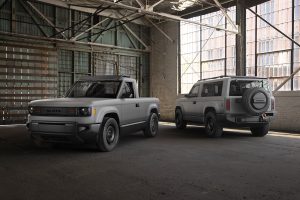
While only one body style will roll off the assembly line, Slate will offer a conversion kit for two different SUV designs.
If anything, Slate is giving a modest twist to an old formula. Back in the 1960s and ‘70s, automakers had a simple solution for those who didn’t want a used car. Stripped-down pickups like the Datsun 520 and Chevy Luv won the hearts of millions of cash-strapped young Baby Boomers.
Back then, one of the features that appealed to many buyers was the ability to work on those trucks and customize them to your heart’s content. So it will be with Slate’s pickup. The company claims it will have at least 100 do-it-yourself options available at launch (and a network of service centers ready to do the customization work if buyers so prefer).
Among other things, that will include two different kits that can be used to convert the pickup into an SUV – something the Slate team showed how to do following its news conference.
The truck’s composite body rolls off the line with a single color. But Slate also showed off some of the many wraps it plans to offer buyers — claiming they’ve made the installation process easy enough to do at home.
More Affordable EV News
- Where’s My Affordable EV? GM and Others Claim it’s Coming
- More on Slate’s Affordable EV
- Ford Shifts Focus to Affordable EVs
Unnecessary content
“We’ve removed all unnecessary content to reduce cost and improve reliability,” said Barman.
The question is whether that process will eliminate potential buyers, as well. While young buyers might have embraced those stripped-down trucks a half-century ago, it’s far less certain they’ll reward Slate for taking the same approach today, said Sam Fiorani, lead analyst with AutoForecast Solutions.
The other problem, said Fiorani, is that the budget buyers Slate is targeting likely live in apartments – or with their parents – “where they don’t have a place to set up a charger.” And that makes EVs “impractical to own.”
On the other hand, the Slate pickup could have real appeal to buyers who want a second, more cost-efficient and environmentally friendly model that also has benefits of a roomy pickup bed. Slate’s model can lay flat 4×8 sheets of drywall or plywood.
Following the money

Amazon founder Jeff Bezos has invested a large sum into Slate – but CEO Chris Barman claims he’s “been very hands-off.”
Slate is just the latest in a long list of EV start-ups to emerge in recent years. Tesla is clearly the most successful, while Rivian and Lucid are seen as the most likely to survive among the rest of the crop. The highway is littered with failures, such as Fisker, Faraday Future, Lordstown Motors and Canoo.
It helps to have some big names, and big money behind you, Slate co-founded in 2022 as Re:Build Manufacturing, by ex-Amazon Consumer CEO Jeff Wilke. The retail giant’s founder Jeff Bezos subsequently came onboard, though the precise amount of money he’s pumped in has not been revealed. In a brief interview with Headlight.News,
Barman said Bezos “has been very hands-off,” functioning as a largely passive investor. But, as “very much a supporter,” his name alone certainly helped Slate quietly raised about $111 million in a Series A round of funding.
It’s since issued more than $1 billion in preferred shares, according to TechCrunch, and an unspecified amount of common stock. Federal filings show additional investors include Mark Walter, the controlling owner of the LA Dodgers and CEO of Guggenheim Partners, and Thomas Tull, a billionaire film producer and businessman. Melinda Lewison, who runs Bezos’ family office, is listed as a Slate Auto director.
What’s next?
Barman and other Slate officials were reluctant to talk about many of the details, such as how much total money they’ve now raised. And while they’ve begun lining up service partners around the country, the specifics will have to follow.
The team remains particularly sensitive whenever the name, “Amazon,” is brought up. For now, those interested in the little pickup can find out more – and place a fully refundable $50 advance reservation by going to slate.auto.
How to complete the sale and when and how it will be delivered? We’ll have to wait for that.
Even production details are yet to be fully revealed, though Slate apparently has lined up what spokesman Jeff Jablansky described as a “brownfield” site somewhere in Indiana which it plans to soon start tooling up. Barman indicated production will begin in late 2026.
“When we reach maximum capacity…in 2027,” she added, “we could make as many as 150,000 a year in this facility.”
Might other versions of the Slate pickup follow? Perhaps one with all-wheel-drive? Might an entirely different product be in development? For those answers, she and other officials said, we’ll have to keep asking.

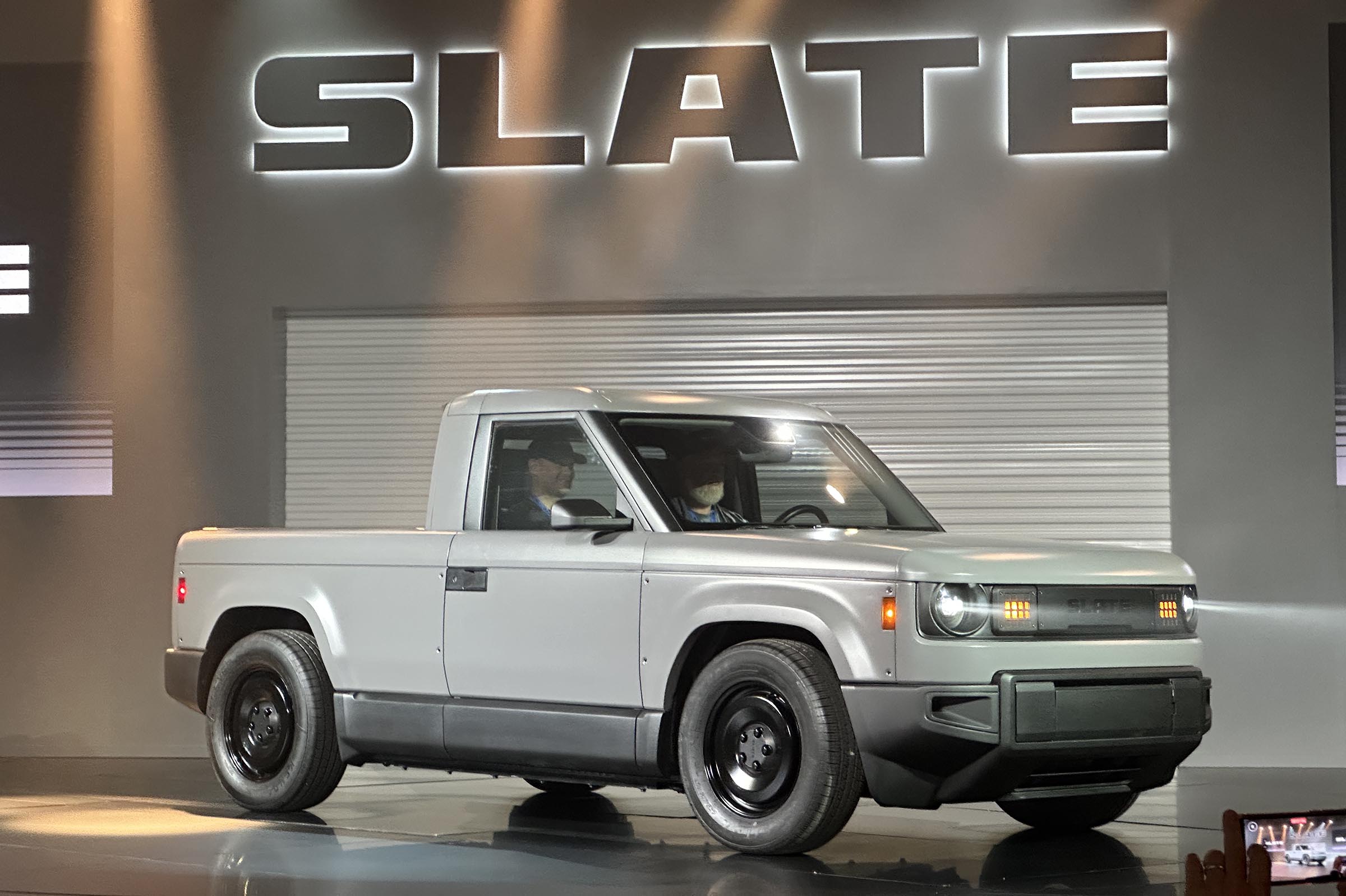
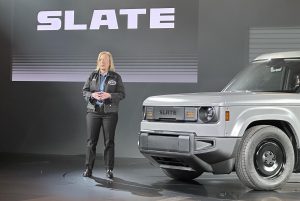
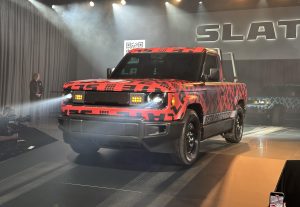
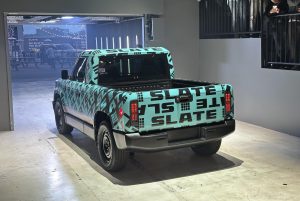
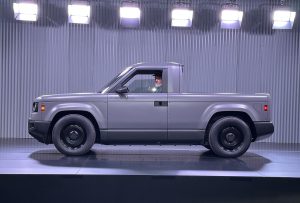

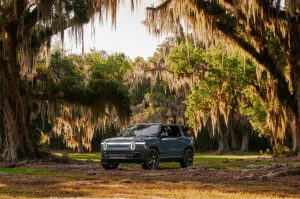
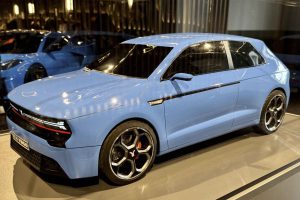
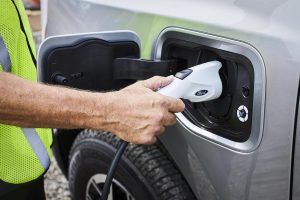
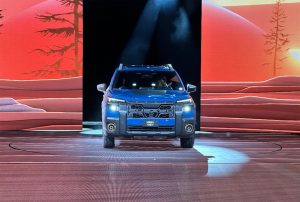

Designed in Michigan, but our @%^&# useless governor can’t support the manufacturing in Michigan.
Nice move.